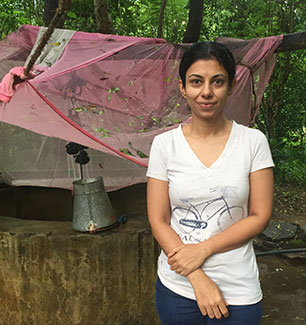Because of a lapse in government funding, the information on this website may not be up to date, transactions submitted via the website may not be processed, and the agency may not be able to respond to inquiries until appropriations are enacted. The NIH Clinical Center (the research hospital of NIH) is open. For more details about its operating status, please visit
cc.nih.gov. Updates regarding government operating status and resumption of normal operations can be found at
opm.gov.
Profile: Fogarty Fellow Dr Shuchi Anand studies chronic kidney disease CKD in India
January / February 2019 | Volume 18, Number 1

Photo courtesy of Shuchi Anand
By Shana Potash
Dr. Shuchi Anand, who was born in India and moved to the U.S. with her family at age 12, noticed something during a return visit that stuck with her. “As I was becoming more aware of the world, I distinctly remember visiting someone in the hospital in India, in my hometown, and seeing the disparity in care,” she said. “It was really heartbreaking.”
Years later, as she pursued a medical degree, a master’s in clinical epidemiology and postdoctoral training in nephrology at U.S. institutions, Anand seized every opportunity she could to work in developing countries and gain experience in global health. A Fogarty fellowship took her back to India - to the Centre for Chronic Disease Control (CCDC), a research organization in New Delhi where, under the mentorship of director Dr. Dorairaj Prabhakaran, Anand studied prevalence and risk factors for chronic kidney disease (CKD), a condition most commonly caused by diabetes and high blood pressure.
“It is a significant problem in terms of chronic disease burden in low-resource settings, and in India in particular, where there’s a lot of diabetes,” Anand noted. At the time of her fellowship, there was little data on CKD in India and most of her time was spent helping to fill that gap.
Anand worked on a large project, the Center for Cardiometabolic Risk Reduction in South Asia (CARRS) Surveillance Study, which through clinic and home visits gathered information related to diabetes, cardiovascular disease and CKD from thousands of people in three large South Asian cities - New Delhi and Chennai, India and Karachi, Pakistan. Anand accompanied interviewers as they went door-to-door to conduct surveys in India and then helped analyze data. A 2015 paper on which Anand was the lead author estimated one in 12 people living in New Delhi and Chennai have evidence of CKD, with diabetes mellitus, pre-diabetes and hypertension that put them at risk of a heart attack, end-stage renal death or other adverse outcomes.
“I sort of grew with Dr. Prabhakaran’s center because this was one of their major population-based surveys, their first one. And it’s the first one that has been rigorously conducted on chronic diseases in India,” Anand said of the exposure the fellowship provided. She was able to watch and learn how the team trained interviewers to interact with study participants and pose survey questions, and she learned how to manage, store and analyze the data that was collected. Anand also gained experience as an editor by working with Dr. Prabhakaran, who was a co-editor on the kidney disease volume of
Disease Control Priorities, Third Edition.
The Fogarty fellowship segued into an NIH career development grant that allowed her to expand upon her work in India. With support from the National Institute of Diabetes and Digestive and Kidney Diseases, Anand conducted mentored research on the epidemiology and management of CKD in South Asians and found, for example, that the prevalence of CKD among people in urban India is similar to that of Indians who emigrated to the U.S., but those living in India are more likely to face worse outcomes.
“My findings are hopefully going to help with health system planning and development. What is the true burden of kidney disease in their population? What are the types of outcomes their population is experiencing? And how can they try to prevent most adverse outcomes?” Anand said. “It also has implications for population health in the U.S. because we have a South Asian minority population here that faces similar risk to kidney disease as people living in India and those risks are a bit different than the Caucasian or African American population.”
More Information
To view Adobe PDF files,
download current, free accessible plug-ins from Adobe's website.